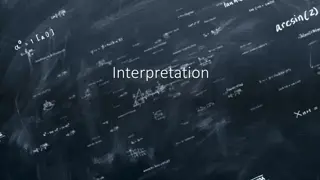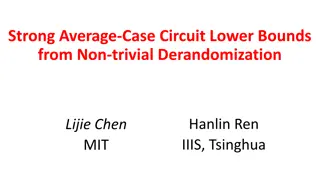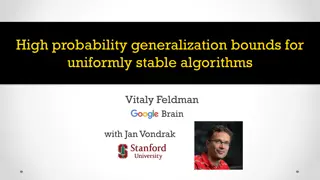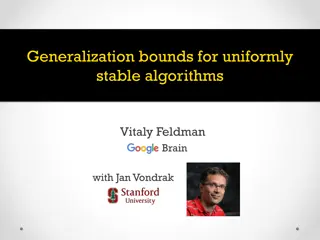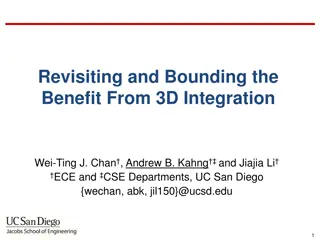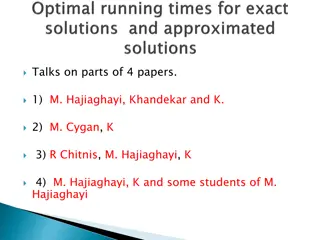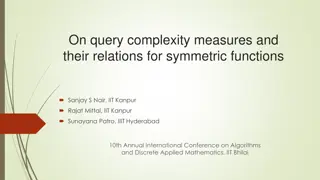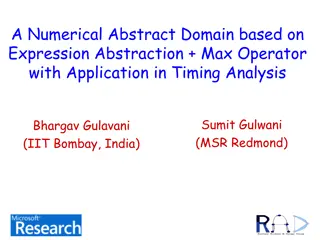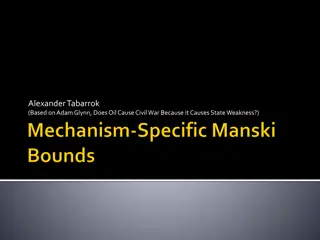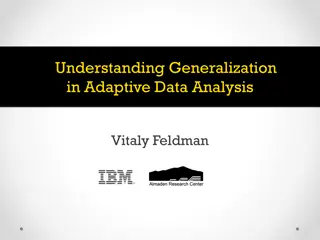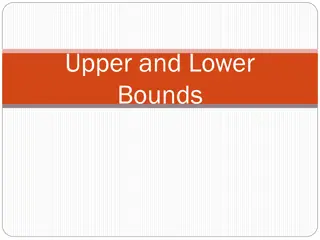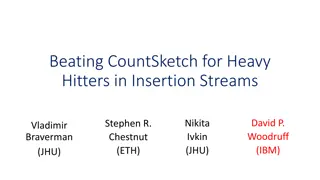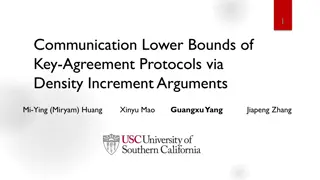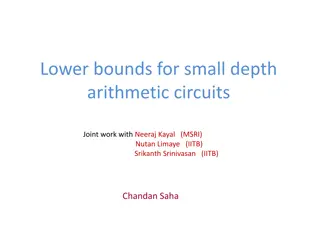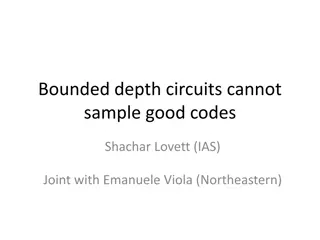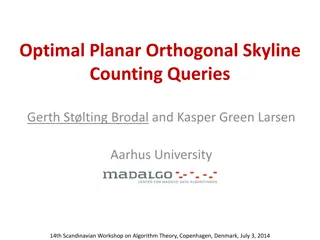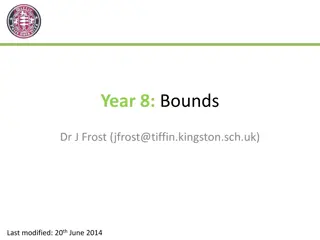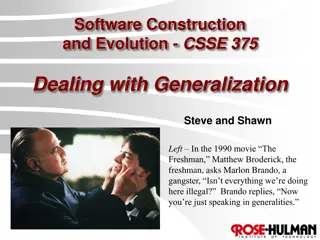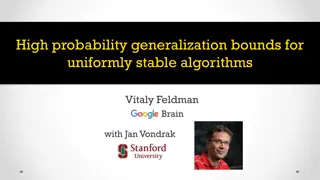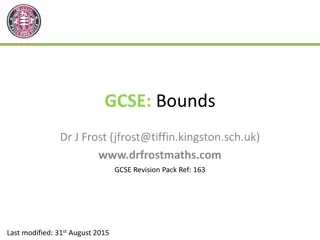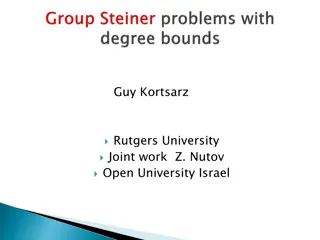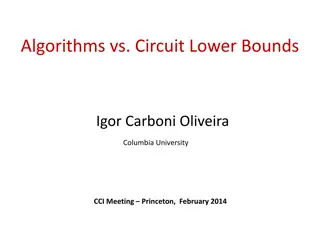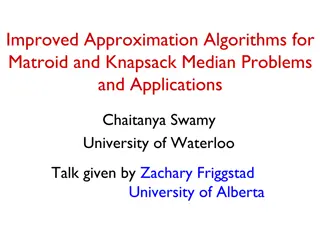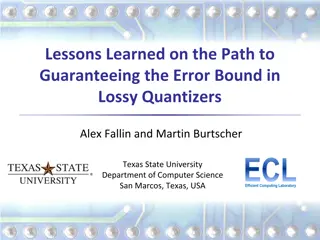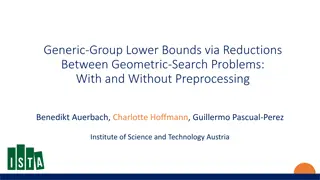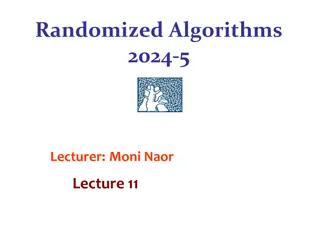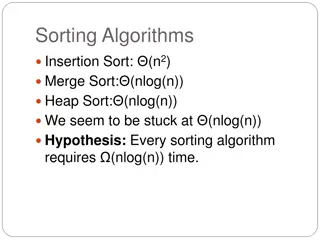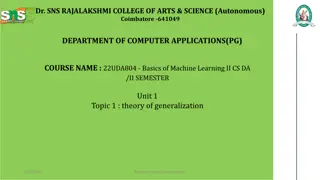Generalization in Research Studies
Generalization in research refers to the extent to which findings can be applied on a larger scale. It is essential for the credibility and applicability of research results. The process of generalization involves statistical generalization and analytical generalization, each serving different purpo
3 views • 5 slides
Generalization: Facts, Opinions, and Validity
Exploring the concept of generalization, this content distinguishes between facts, opinions, and valid generalizations. It emphasizes how generalizations are broad statements based on information and experiences, while facts can be proven true and opinions are belief-based. Key words and examples ar
3 views • 8 slides
Strong Average-Case Circuit Lower Bounds: A Brief Overview
Exploring the history and motivation behind the Circuit Lower Bounds Program focused on proving complexity class separations through non-trivial derandomization, with a primary emphasis on Strong Average-Case Lower Bounds. Ren and Chen delve into the pursuit to establish ?? ≠ ? since the 1980s.
1 views • 61 slides
Generalization of Empirical Risk Minimization in Stochastic Convex Optimization by Vitaly Feldman
This study delves into the generalization of Empirical Risk Minimization (ERM) in stochastic convex optimization, focusing on minimizing true objective functions while considering generalization errors. It explores the application of ERM in machine learning and statistics, particularly in supervised
2 views • 11 slides
Stability and Generalization in Machine Learning
Exploring high probability generalization bounds for uniformly stable algorithms, the relationship between dataset, loss function, and estimation error, and the implications of low sensitivity on generalization. Known bounds and new theoretical perspectives are discussed, along with approaches like
1 views • 8 slides
Generalization Bounds and Algorithms in Machine Learning
Generalization bounds play a crucial role in assessing the performance of machine learning algorithms. Uniform stability, convex optimization, and error analysis are key concepts in understanding the generalization capabilities of algorithms. Stability in optimization, gradient descent techniques, a
0 views • 16 slides
Investigating Power and Area Reduction Bounds in 3D Integration
This study focuses on establishing upper bounds for power and area reduction in 3D Integrated Circuits (3DICs), specifically exploring the benefits of multi-tier 3DICs compared to lower-tier configurations. Previous works and evaluations on power and wirelength benefits are discussed, highlighting t
0 views • 24 slides
Artificial Intelligence Techniques
Artificial Intelligence (AI) techniques leverage knowledge representation to achieve generalization, ease of adaptation, and problem-solving capabilities. Knowledge, although voluminous and dynamic, is crucial for developing effective AI solutions. By capturing important properties and enabling adju
2 views • 25 slides
Insights into Advanced Algorithmic Problems
Delve into discussions surrounding complex algorithmic challenges, such as the limitations in solving the 3-SAT problem within specific time bounds, the Exponential Time Hypothesis, proving lower bounds for algorithms in various scenarios, and exploring approximation ratios in algorithm design. Thes
2 views • 65 slides
Tail Bounds in Probability for Computing
Tail bounds in probability theory play a crucial role in analyzing random variables and understanding the behavior of certain events. This content explores the concept of tail bounds, their importance through examples, and the derivation of upper bounds on tails. Markov's inequality is also discusse
0 views • 31 slides
Quantum Query Complexity Measures for Symmetric Functions
Explore the relationships between query complexity measures, including quantum query complexity, adversary bounds, and spectral sensitivity, in the context of symmetric functions. Analysis includes sensitivity graphs, the quantum query model, and approximate counting methods. Results cover spectral
0 views • 19 slides
Numerical Abstract Domain with Max Operator in Timing Analysis
Explore a numerical abstract domain based on expression abstraction and the Max operator with applications in timing analysis. The challenges in timing analysis, such as disjunctive and non-linear bounds, are discussed along with simple examples illustrating these concepts. The difficulty of proving
1 views • 21 slides
Analysis on Oil's Impact on Civil War and State Weakness
The analysis delves into the potential causal effects of oil on civil war and state weakness. By examining the observed data and establishing bounds, it suggests that oil could either significantly reduce wars or have a small positive effect. Furthermore, it explores how oil may lead to war through
2 views • 6 slides
Generalization in Adaptive Data Analysis by Vitaly Feldman
Adaptive data analysis involves techniques such as statistical inference, model complexity, stability, and generalization guarantees. It focuses on sequentially analyzing data with steps like exploratory analysis, feature selection, and model tuning. The approach emphasizes on avoiding hypothesis te
0 views • 25 slides
Additive Combinatorics Approach to Log-Rank Conjecture in Communication Complexity
This research explores an additive combinatorics approach to the log-rank conjecture in communication complexity, addressing the maximum total bits sent on worst-case inputs and known bounds. It discusses the Polynomial Freiman-Ruzsa Conjecture and Approximate Duality, highlighting technical contrib
0 views • 9 slides
Upper and Lower Bounds in Mathematics
Exploring the concept of upper and lower bounds in mathematics, this content discusses how numbers are rounded to the nearest whole number and identifies the possible maximum and minimum values. It also provides examples and rules for finding upper and lower bounds, as well as practical applications
0 views • 6 slides
Advanced Techniques for Heavy Hitters Detection in Insertion Streams
Beating CountSketch algorithms, like those presented by David P. Woodruff and team, offer innovative solutions for identifying heavy hitters in insertion streams with minimal space complexity. Guarantees such as L1 and L2 outputs and the CountSketch approach are explored to achieve efficient heavy h
0 views • 18 slides
Lower Bounds in the Cell Probe Model
Exploring the concept of lower bounds for static data structures, this content delves into the tradeoffs between query time and space efficiency. It discusses the need for proving lower bounds, the model of data structures, and how CPUs access memory in computational devices. Kasper Green Larsen fro
1 views • 45 slides
Communication Lower Bounds of Key-Agreement Protocols
Key-agreement protocols play a vital role in secure communication between parties. This document explores lower bounds of key-agreement protocols through density increment arguments, idealization of symmetric primitives, Merkle puzzles, and the impact of communication bits between Alice and Bob. Var
1 views • 10 slides
Lower Bounds for Small Depth Arithmetic Circuits
This work explores lower bounds for small-depth arithmetic circuits, jointly conducted by researchers from MSRI, IITB, and experts in the field. They investigate the complexity of multivariate polynomials in arithmetic circuits, discussing circuit depth, size, and the quest for an explicit family of
1 views • 114 slides
Lower Bounds on Sampling Good Codes in Bounded-Depth Circuits
Bounded-depth circuits are proven unable to sample or approximate good codes effectively. This work delves into lower bounds, showcasing that bounded families of circuits face limitations in computing specific functions or sampling distributions. The example of Parity in AC0 circuits illustrates the
1 views • 21 slides
Advanced Techniques for Orthogonal Skyline Counting Queries
Advanced techniques for orthogonal skyline counting queries discuss optimal planar solutions, dividing and conquering for topmost point identification, efficient vertical slab counting, succinct data structures for prefix sums and range maxima, upper bounds on degree and multi-slab queries, as well
0 views • 11 slides
Measurement Bounds and Accuracy
Exploring the concepts of significant figures, bounds, accuracy, and ranges in measurement. From determining the smallest and largest possible lengths to finding lower and upper bounds based on accuracy, this content focuses on practical exercises and explanations to enhance understanding. Learn how
0 views • 6 slides
Dealing with Generalization in Software Construction
Explore methods to address common code smells related to generalization in software development, such as dealing with duplicate code, inappropriate intimacy, and large classes. Learn how to apply techniques like Pull Up Field, Pull Up Method, and Extract Subclass to improve your code structure and m
0 views • 20 slides
Unsupervised Cross-Task Generalization for Multi-Task NLP Models
Enhance the multi-task NLP models with unsupervised cross-task generalization through retrieval augmentation. Explore frameworks like ReCross to improve model performance across diverse tasks. Dive into the world of upstream training and hidden dimensions in this cutting-edge approach to natural lan
0 views • 11 slides
Analyzing Generalization in Program Analysis
In this content, we explore the concept of generalization in program analysis, focusing on how increased precision can lead to worse results due to unbounded behaviors. Discussions revolve around the need to generalize observations, model the generalization process using the Probably Approximately C
0 views • 29 slides
High Probability Generalization Bounds for Stable Algorithms
This content delves into high probability generalization bounds for uniformly stable algorithms, showcasing insights on stability and generalization in machine learning. It covers topics such as stability in the face of individual examples, known bounds from previous studies, stochastic convex optim
0 views • 8 slides
GCSE Bounds Revision Pack
GCSE bounds concepts with exercises on significant figures, lower and upper bounds, and calculating areas within given accuracy levels. Understand the importance of considering bounds in mathematical calculations for precise results.
0 views • 9 slides
Group Steiner Tree Problem: Approximation Methods and Degree Bounds
The Group Steiner Tree Problem involves finding a tree rooted at a central vertex that connects transistors located at different ports in a VLSI circuit. Various approximation methods and degree bounds have been explored, with a focus on low degrees for efficient layout and routing. Known approximat
0 views • 21 slides
New Circuit Lower Bounds and Complexity Theory Insights
Explore new circuit lower bounds and complexity theory insights, including motivation, background, new results, and known facts. Discover the significance of exponential circuit lower bounds and the challenges within complexity theory.
0 views • 43 slides
Understanding Circuit Lower Bounds and Algorithm Techniques
Explore the intersection of algorithms and circuit lower bounds in this informative talk, covering topics like explicit functions, compression, and nontrivial proofs for computational problems. Discover the significance of learning satisfiability and techniques for deterministic, nondeterministic, a
0 views • 32 slides
Improved Approximation Algorithms for Matroid Median Problems and Applications
Discover how matroid median problems offer a unified framework for solving diverse facility location challenges efficiently, with improved bounds and rich modeling power. Explore the clean and natural generalization of various facility location scenarios, providing a comprehensive solution for seemi
0 views • 31 slides
Insights on Achieving Error Bounds in Lossy Quantizers
Explore the journey towards ensuring error bounds in lossy quantizers, crucial for handling vast scientific data in HPC settings. Learn about the challenges of lossy compression, support for heterogeneous systems, and a cutting-edge LC Framework tool for automatic compressor synthesis. Dive into how
0 views • 26 slides
Lower Bounds and Reductions in Geometric Search Problems
Explore lower bounds and reductions in geometric search problems, featuring the generic group model, GGM hardness, and transfer bounds via algebraic group models. Learn about extensions to preprocessing bounds and the technical overview of these concepts for problem-solving.
0 views • 13 slides
Randomized Algorithms 2024-5: Guessing Cards and Communication Complexity Bounds
Explore the concepts of guessing cards, simultaneous communication complexity bounds, and efficient encoding techniques in randomized algorithms. Dive into strategies for memory-based card guessing and optimal memory allocation for maximizing correct guesses. Discover the underlying principles of si
0 views • 48 slides
Understanding Tail Bounds and Confidence Intervals for Random Variables
Explore the concept of tail bounds in probability theory, along with confidence intervals for random variables. Learn about Markov's Inequality and how it provides upper bounds for probabilities, illustrated with examples involving dice rolls and online advertising.
0 views • 22 slides
Understanding Tail Bounds and Markov's Inequality
Tail bounds and Markov's Inequality are crucial concepts in probability theory and statistics. Tail bounds help us approximate probabilities in the tails of distributions, while Markov's Inequality provides a bound on the probability that a non-negative random variable exceeds a certain value. Learn
0 views • 25 slides
Understanding Sorting Algorithms and Lower Bounds
Explore the concept of sorting algorithms, lower bounds, and comparison-based sorting, discussing the time complexity and required comparisons in different scenarios. Dive into hypotheses, proving lower bounds, and average case analysis to gain insights into the efficiency of various sorting methods
0 views • 8 slides
Understanding Theory of Generalization in Machine Learning
Theory of generalization in machine learning is essential for models to perform well on new data after training. It explores the concepts of overfitting, underfitting, bias-variance tradeoff, and more to ensure models can adapt effectively to unseen data.
0 views • 6 slides
Explore Sub-Object Bounds and Overflow Prevention Techniques
Delve into understanding sub-object bounds in CHERI and sub-object overflow prevention methods. Learn about structure layout, risks of buffer overflow, CHERI sub-object hardening, and the importance of not narrowing bounds of pointers to sub-objects. Discover why sub-object bounds should be applied
0 views • 6 slides
